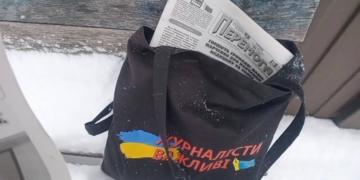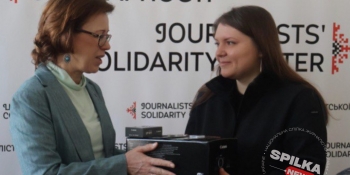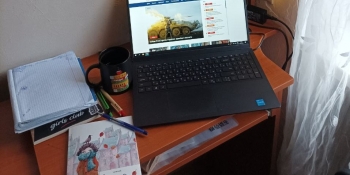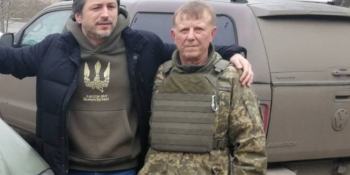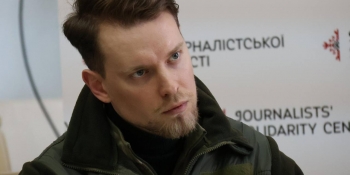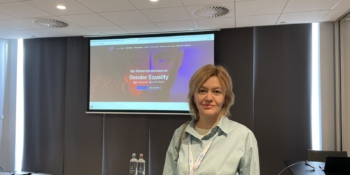The other day, the Dnipro Journalists’ Solidarity Center of the National Union of Journalists of Ukraine (NUJU) held a training entitled Physical And Psychological Safety Of Journalists While Working In The Area Of Hostilities. Media representatives of the Dnipropetrovsk Region, students, and teachers of specialized faculties attended the event. This time, the head of the combat stress control group of the Dnipro anti-aircraft missile brigade/captain Mariya Tkachenko and sanitary instructor senior sergeant Olena Borysenko shared their work experience.
“The war goes on, and journalists continue to hold the information front. They keep it decently and responsibly. However, today the journalists’ community must not stop covering events only but should also ensure their safety. That is why conducting safety trainings is among the priorities in the work of the Dnipro Journalists’ Solidarity Center of the NUJU,” emphasized Natalia Nazarova, the coordinator of the Dnipro Center.
The meeting participants talked about preparation for a trip to a conflict zone: from the moral to the practical aspect. The experts drew attention to the fact that media people are more responsible for such trips. But some tips will help you conduct a dialogue with the military professionally and can also save lives. We invite you to listen.
– consider that preparation for a trip to a conflict zone will take more than one day;
– prepare yourself physically; no one will take care of you. You are responsible for your own life;
– it is better to go to the combat zone with colleagues, unite in groups, and distribute roles and responsibilities;
– it is desirable to make sure that several people in the group be able to drive a car;
– study information about the unit and the military you plan to communicate with;
– do not ask the military about personal and family information. Such questions are inappropriate;
– think over the questions in advance; they should be clear, correct, and appropriate;
– Do not give in to emotions if the dialogue does not work. Remember – the military have their own traditions and superstitions. Their mood and condition can change dramatically;
– take care of comfortable non-bright clothes and a shoulder bag where you can put all the necessary things;
– take spare charging stations and memory cards with you;
– under no circumstances go to the area of hostilities without a first-aid kit and means of protection: body armor, helmet. Try them on in advance and adjust them to your body;
– be mentally prepared for the worst possible events: from injury to capture. In such cases, consult with the press officers or responsible for the mission about the “legend”;
– learn the purpose of all the tools in the first-aid kit and practice applying tourniquets and bandages;
– remember the main rule: medical assistance is provided only in the green zone. During the shelling, we save our lives in the first place. Dangerous heroism can end in tragedy.
The Dnipro Journalists’ Solidarity Center houses a point of free rental of protective equipment for media workers who will work in hot spots. The Center received certified bulletproof vests with the inscription PRESS and helmets from UNESCO with the assistance of the International Federation of Journalists.
Call the Dnipro Journalists’ Solidarity Center – +38 050 919 8479 (Natalia Nazarova, the coordinator of the Dnipro Center). Address: 8, Starokozatska Street.
As earlier reported, Journalists’ Solidarity Centers are an initiative of the NUJU implemented with the support of the International and European Federations of Journalists and UNESCO. The initiative is aimed at helping media representatives working in Ukraine during the war. The centers operate in Kyiv, Lviv, Ivano-Frankivsk, Chernivtsi, Zaporizhzhia, and Dnipro and provide journalists with organizational, technical, legal, psychological, and other types of assistance.
About UNESCO. UNESCO is the United Nations Educational, Scientific, and Cultural Organization. It contributes to peace and security by promoting international cooperation in education, sciences, culture, communication, and information. UNESCO promotes knowledge sharing and the free flow of ideas to accelerate mutual understanding. It is the coordinator of the UN Action Plan on the Safety of Journalists and the Issue of Impunity, which aims to create a free and safe environment for journalists and media workers, thus strengthening peace, democracy, and sustainable development worldwide. UNESCO is working closely with its partner organizations in Ukraine to provide support to journalists on the ground.
The designations employed and the presentation of material throughout this digest do not imply the expression of any opinion whatsoever on the part of UNESCO concerning the legal status of any country, territory, city or area or its authorities, or concerning the delimitation of its frontiers or boundaries.
The authors are responsible for the choice and the presentation of the facts contained in this digest and for the opinions expressed therein, which are not necessarily those of UNESCO and do not commit the Organization.
NUJU’s Journalists’ Solidarity Center in Dnipro





